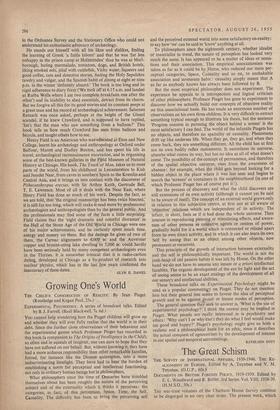Growing One's World
THE CHILD'S CONSTRUCTON OF REALITY. By Jean Piaget. (Routledge and Kegan Paul, 25s.) EXPERIMENTAL, PSYCHOLOGY. A series of broadcast talks. Edited by B. J. Farrell. (Basil Blackwell, 7s. 6d.)
You cannot help wondering how the Piaget children will grow up and whether they will ever fully realise that the world is in their debt. Since the further close observations of their behaviour and the experimental games which Professor Piaget has recorded in this book (a companion to The Origins of Intelligence in the Child), so often end in squeals of laughter, one can dare to hope that they have not suffered on our behalf. But, without knowing it, they have had a more arduous responsibility than other remarkable families, forced, for instance like the Dionne quintuplets, into a more indiscriminating limelight. They have had to bear the burden of establishing a norm for perceptual and intellectual functioning, not only in ordinary human beings but in philosophers.
What philosophers since the time of Descartes have troubled themselves about has been roughly the nature of the perceiving subject and of the externality which it thinks it perceives : the categories, in fact, of this perception, Space, Timer the Self, Causality. The difficulty has been to bring the perceiving self
and the perceived external world into some satisfactory co-reality: to say how 'we' can be said to 'know' anything at all.
To philosophers since the eighteenth century, whether idealist or materialist in trend, the nature of perception has looked very much the same. It has appeared to be a matter of ideas or sensa- tions and their association. This empirical associationism was taken as far as it could be by Hume, who reduced our main per- ceptual categories, Space, Causality and so on, to unshakable association and inveterate habit : causality simply meant that A as far as anybody knows has always been followed by B.
But the most empirical philosopher does not experiment. The experience he appeals to is introspection and logical criticism of other philosophers. Professor Piaget has gone to experiment to discover how we actually build our concepts of objective reality on this associational basis. He has made an enormous number of observations on his own three children. It is very difficult to extract something typical enough to illustrate his thesis, but the sentence 'Progress consists in pursuing the object behind a screen' is the most satisfactory I can find. The world of the infantile Piagets has no objects, and therefore no spatiality or causality. Phenomena drift up like undersea life. When they go, they go, and when they come back, they are something different. All the child has at first are its own bodily reflex movements. It assimilates its universe, absorbs what comes its way, but has no idea at all of what doesn't come. The possibility of the concept of permanence, and therefore of the spatial objective universe, rises from the awareness of absence : for example, when the child gets beyond looking for a hidden object in the place where it was last seen and begins to search the 'screens' or containers in the neighbourhood (in one of which Professor Piaget has of course put it !).
But the process of discovery and what the child discovers are still extensions of its own activity (although it cannot yet be said to be aware of itself). The concept of an external world grows only in relation to this subjective centre, at first not at all aware of 'objective' relations which are independent of its activity. The infant, in short, feels as if it had done the whole universe. Then interest in reproducing pleasing or stimulating effects, and aware- ness of other persons as causative agents or centres of power, gradually build for it a world which is connected or related apart from its own direct activity, and in which it can also learn its own Self by seeing that as an object among other objects, now permanent or recurrent. This principle of the growth of interaction between externality and the self is philosophically important. The world is not the junk-heap of old passive habits it was left by Hume. On the other hand we do not have to assume any innate or a priori intellectual faculties. The organic development of the eye by light and the act of seeing seems to be an exact analogy of the development of all our sensory and intellectual abilities.
These broadcast talks on Experimental Psychology might be used as a popular commentaiy on Piaget. They do not mention him but their general line seems to favour the idea of perceptual growth and to be against gestalt or innate modes of perception. The general question they seek to answer is, 'What is the use of experimental psychology?' I think the answer may be implied in Piaget. What people are really interested in is psychiatry and ethics : 'Why can't I or why can't they do what I feel would make me good and happy?' Piaget's psychology might give us both a realistic and a philosophical basis for an ethic, since it describes the actual conquest of egocentrism by the development of interest in our spatial and temporal surroundings.
KATHLEEN NOT'.


































 Previous page
Previous page